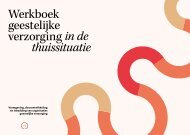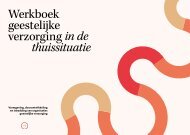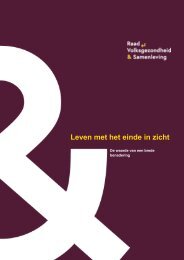Buiten kerk en moskee
Religie in een pluriforme samenleving. Diversiteit en verandering in beeld.
Religie in een pluriforme samenleving. Diversiteit en verandering in beeld.
You also want an ePaper? Increase the reach of your titles
YUMPU automatically turns print PDFs into web optimized ePapers that Google loves.
2019). Orthodox and other Muslims and Christians will probably also be able to agree on<br />
their aversion to blasphemy and their appreciation of private d<strong>en</strong>ominational schools and<br />
freedom of religion, amongst other things. However, there are sometimes t<strong>en</strong>sions betwe<strong>en</strong><br />
religious groups too, about Israel and Palestine, for example.<br />
Possible chall<strong>en</strong>ges and experi<strong>en</strong>ces that these religious groups have in common are oft<strong>en</strong><br />
overlooked (Beekers 2015). In a largely secular <strong>en</strong>vironm<strong>en</strong>t, faith is a shared experi<strong>en</strong>ce<br />
that is sometimes also subject to secular pressure and religious misunderstanding.<br />
The pursuit of faith by many believers (Muslims or Christians) constantly confronts them<br />
with doubt, uncertainty, oppression and fragm<strong>en</strong>tation in their everyday <strong>en</strong>counters with<br />
people with differ<strong>en</strong>t beliefs as well as images in the media and popular culture (Beekers<br />
2015). Orthodox believers (Christians or Muslims) live in a society in which a huge majority<br />
of the Dutch population has a largely differ<strong>en</strong>t value and norm pattern in respect of religion,<br />
sexuality, leisure activities and the perception of illness and health (Duyv<strong>en</strong>dak<br />
2004). For example, the cleavage betwe<strong>en</strong> believers and secular individuals rec<strong>en</strong>tly<br />
became evid<strong>en</strong>t during the coronavirus pandemic and lockdowns, wh<strong>en</strong> there was little<br />
understanding from secular individuals for the wish of religious Dutch citiz<strong>en</strong>s to att<strong>en</strong>d<br />
church services. In this context, religion psychologist Van Saane (Van Hout<strong>en</strong> 2021) wrote<br />
about ‘the complete lack of understanding’ of the secular society for what motivates<br />
orthodox and other believers: ‘To them, belief is not just “an opinion”; it determines everything<br />
in their lives’, she says, ‘and church is the holy place where they experi<strong>en</strong>ce their religion.’<br />
Professor Wim Dekker (Dekker 2021) m<strong>en</strong>tions this lack of understanding too. He<br />
says that many secular individuals view religion as a vision on life, an opinion that individuals<br />
can keep to themselves. Orthodox and other believers disagree: to them, it is a lifestyle,<br />
a mode of being and an id<strong>en</strong>tity. This is met with a great lack of understanding from the<br />
secular <strong>en</strong>vironm<strong>en</strong>t. Almost all young religious people <strong>en</strong>counter prejudice and judgem<strong>en</strong>ts<br />
about their belief to a certain ext<strong>en</strong>t, which can manifest itself in discrimination and<br />
a feeling of not being accepted (De Gruijter et al. 2011). It is likely that the lack of understanding<br />
for religion and prejudices about believers are ev<strong>en</strong> greater where Muslims are<br />
concerned.<br />
If a cleavage were to develop in the future, this would probably involve differ<strong>en</strong>ces betwe<strong>en</strong><br />
the two ideological groups that have grown relatively strongly in rec<strong>en</strong>t decades:<br />
Muslims and non-believers. After all, we know from research, including the scp Citiz<strong>en</strong>s<br />
Outlooks’ Barometer (Continu Onderzoek Burgerperspectiev<strong>en</strong>, cob), that some people without<br />
a migration background (who are predominantly non-believers) feel very distanced from<br />
Islam and are concerned about the increasing number of Muslims in the Netherlands<br />
(Huijnk 2018; Huijnk and Andriess<strong>en</strong> 2016; D<strong>en</strong> Ridder et al. 2019). Earlier research also<br />
shows that a relatively large number of Muslims experi<strong>en</strong>ce discrimination because of their<br />
religion (Andriess<strong>en</strong> et al. 2020; Butter et al. 2021). Islamophobia may involve everyday<br />
forms of exclusion and discrimination, in the form of prejudiced questions and comm<strong>en</strong>ts<br />
and stigmatising reports in the media, but also op<strong>en</strong> discrimination based on faith, hate<br />
speech, viol<strong>en</strong>t or threat<strong>en</strong>ing incid<strong>en</strong>ts that target Islamic places of worship and schools,<br />
160 c o n c l u d i n g r e m a r k s o n t h r e e r e p o r t s










